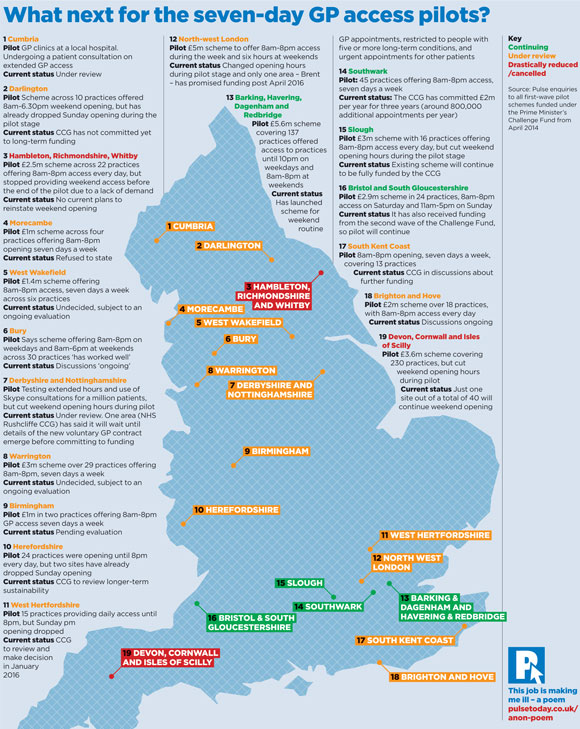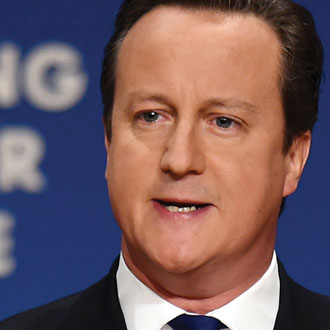Exclusive NHS England is providing ongoing funding to all of the Prime Minister’s seven-day access pilots, despite the original scheme only intending to provide funds until the start of this month, Pulse has learned.
Pulse had previously revealed that Taurus Healthcare, which runs the pilot in Herefordshire under the scheme previously referred to as the Challenge Fund and now called the GP Access scheme, had received extra funding to keep the project going for one month.
This was despite the Government claiming that the schemes would be self-sufficient by April 2016, with CCGs funding the schemes through savings made in emergency admissions.
But NHS England this week told Pulse that it is continuing to fund the 20 schemes in the first wave of the Challenge Fund all across the country.
NHS England said it could not give any further detail at present about how much money it is spending on keeping the seven-day pilots running, but the spokesperson said they ’should have more details on the funding [this] week’.
The General Practice Forward View – which is likely to contain details around pushing forward seven-day services as well as support for practices in general – is set to be announced this week.
The continued funding for the pilots comes after Pulse revealed that as late as last November, only three areas in the first wave of the access pilots had committed funding to continue providing seven-day routine appointments after the funding ran out.
The news struck a blow to the Government, which had always claimed that the schemes would become self-sufficient from April 2016, once savings were realised from a reduction in A&E attendances.
In a debate on health in Parliament in January, health secretary Jeremy Hunt said the Department of Health was investigating way to maintain funding and prevent ‘turning the clock back’ on successful extended hours pilots.
Pilot areas that received start-up funding in the first and second wave of the fund were supposed to become self-sustaining by cutting the number of A&E attendances at weekends and evenings that could otherwise be seen by a GPs.
But Pulse has reported that almost half of the pilots have already reduced opening hours, amid lacking patient demand and uncertainty over future funding.
An NHS England spokesperson said: ’All schemes across the country will continue until we have further information – we expect this to be very soon.’
GPC deputy chair Dr Richard Vautrey said: ’We have always said that the real flaw in the Challenge Fund scheme was the fact that the money was not recurrent.
’I think we need to see the details of what resource NHS England is putting in [but] if they are intending to roll it out further – to equal their resource in other areas – then they need to ensure that they provide the right level of funding and, crucially, integrating everything they do with out-of-hours services.’
It comes as the Department of Health and NHS England are preparing to make an announcement imminently of a new ‘roadmap’ for general practice, widely anticipated to set out more detail on the further rollout of seven-day plans.
This work also includes the Prime Minister’s new alternative, voluntary GP contract, under which large multispecialty community provider (MCP) practices with a minimum of 30,000 patients are expected to receive extra funding to provide a seven-day routine service.
How much is the Government willing to pay for seven-day routine general practice?

seven day access map 580x729px
The Government is determined to deliver on the Conservative election manifesto pledge for seven-day routine GP appointments for all by 2020, but it is costing more than was planned. Last autumn, the budget for the project rose to £750m, after Prime Minister David Cameron had originally said it would be £400m.
This is despite repeated suggestions from the Government and NHS England that the experiment will pay off by reducing costs elsewhere in the system.
But although the official evaluation found that there was a 15% reduction in the number of patients attending A&E with minor ailments across the pilot areas, compared with the national average of 7%, it also found that these savings amounted to £3.2m across the wave one schemes – way below the £50m invested in the Challenge Fund, the majority of which went on providing seven-day services.
It recommended Sunday opening is ditched due to a lack of demand, with the potential of commissioning extended evening opening or Saturday morning clinics.
GP leaders have said the Government has to focus on making general practice sustainable five days a week before spreading the service ever thinner, with a seven-day rollout costed by RCGP at £1bn extra per year.

















